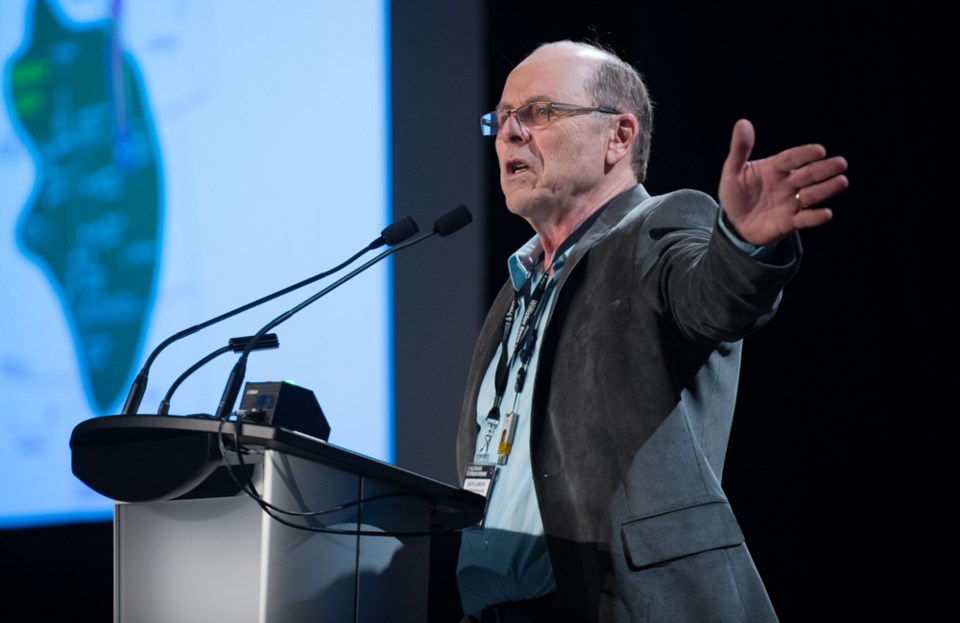Regina – Manitoba has been growing its oil production for several years now, but that’s expected to change this year, with the dramatic drop in oil prices.
Keith Lowdon, director of the Manitoba Petroleum Branch with the Manitoba Mineral Resources ministry, spoke to Pipeline News on April 28 during the Williston Basin Petroleum Conference about how things are going in that province.
“For the beginning of the year, it’s been pretty good, for 2015, from January to the end of March. We’re down about 15 per cent from the year before in drilling. It’s not as bad as I thought it would be, considering the price and everything that’s going on,” he said.
For production, he said, “We’re down. We’re probably about 47,000 barrels per day.
“We were up to 52,000 barrels per day for a little bit, but the annual production was about 50,000.”
In 2014 Manitoba drilled 464 wells with up to 21 rigs working, but the province’s outlook for 2015 is much lower. The Petroleum Branch anticipates 280 wells. To April 29, drilling was down 25 per cent over last year.
Expenditures are also expected to be down to $700 million.
One of the most significant events of the last year was Tundra Oil and Gas buying out EOG Resource’s Waskada property. The two biggest players in the Waskada play have been EOG and Penn West Exploration, but Penn West has had corporate trouble of its own for a while now.
Tundra took possession of the EOG’s assets on Jan. 1, 2015.
“We don’t know what their plans are. EOG will have some drilling commitments, I’m sure, but we don’t know what Tundra’s plans are. EOG and Penn West had basically quit drilling by the end of last year. The last quarter, they didn’t do much drilling anyway,” said Lowdon.
Similar to what happened in the early 1980s, Waskada went boom, and now it has largely gone bust, until activity picks up. Penn West’s property is up for sale at Waskada, and EOG’s sold. Tundra’s wholly-owned subsidiary, Red Beds Resources Limited, is another producer in the Waskada area.
It is very slow in Waskada, Lowdon said. Not much is happening in the nearby Pierson area, either. CNRL has licensed a few wells in that area. “They’re pretty consistent. They just keep doing what they’re doing,” he said.
“It’s been pretty quiet in that country,” he said of the extreme southwest corner of the province.
The main drilling areas in Manitoba of late have been the Daly-Sinclair field, Virden, Manson and Birtle (the Birdtail field). The last two are north Highway 1 on the west side of the province, northwest of Virden.
The area around Cromer was quite busy in January. Indeed, when Pipeline News did a story on fracking near Cromer in early January, the activity in that area looked more like oil was at $100 a barrel, not $47. So what does that mean for this summer?
“Honestly, we don’t know what’s going to happen. We’re waiting for road bans to lift. I think they (the oil companies) made their decisions and finished their expenditures. We were expecting a bigger drop than what we had,” said Lowdon.
Manitoba has seen some activity in the Virden area, but more to the northwest of the province’s long-time oil capital. Elcano has been drilling south of Miniota.
“They’re finding production where there wasn’t any before,” he said.
“In the Birdtail area it’s been mostly Tundra working. As by far the largest oil company in the province, he noted, “There’s less and less that isn’t Tundra.”
Recompletions can be really important, he said. Lowdon noted that in some cases, companies have perforated other zones from their original targets. As an example, he spoke of Lodgepole wells which have since been perforated in the Upper Virden or Flossy Lake formations. Companies have found this a cost effective way to improve production.
In some cases, the horizontal portion of the well is not even being used anymore, and the vertical portion has been put on production.
Is comingling production from different formations an issue? Not really, the director said. Some tests are needed, but he said, “Comingling is not the ugly word it was before.”
There were 64 recompletions in 2014. The Virden/Daly field was the prime area for this activity.




